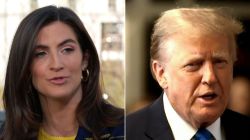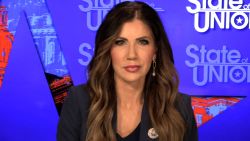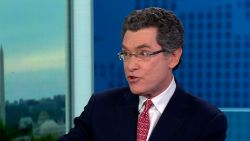A federal judge is forcing a conservative lawyer who had worked for then-President Donald Trump before the January 6 insurrection to respond to a House select committee subpoena of Chapman University for his emails – setting congressional investigators up to receive access to information they’ve wanted for months but had not been able to get.
Federal Judge David Carter in Santa Ana, California, on Monday pinned down exactly when law professor John Eastman was at work for his client, Trump, as he devised a plan to overturn the 2020 election result.
A lawyer for Eastman told the judge during a court hearing Monday that his client had been working for Trump during a number of major controversial moments leading up to January 6: When he told state legislators on January 2 they needed to “fix this, this egregious conduct” that would put Joe Biden in the White House, when he was in the Willard Hotel with other Trump contacts, and when he met with Trump and Vice President Mike Pence on January 3 about blocking the congressional certification of the 2020 vote.
The admissions from Eastman’s lawyer, Charles Burnham, are the clearest statements yet on how much Eastman was doing on Trump’s behalf – rather than on his own initiative – in the days leading up to January 6, 2021.
“That work was done pursuant to representation of the president,” Burnham said, when asked specifically about Eastman briefing hundreds of state legislators.
The judge then asked Eastman’s team who his client was during each of the moments the House sought information about in their letter to Eastman announcing his subpoena. Eastman had been working for his client, Trump, his lawyer said in court to nearly every question.
Eastman previously refused to provide information to the House when it subpoenaed him directly for testimony and documents. He had claimed his Fifth Amendment protection against self-incrimination as a response to nearly 150 questions and to his document subpoena, a lawyer for the House said on Monday.
The House committee then went to his former employer, Chapman University, to seek his records. The university received a House subpoena last week, and Eastman sued to block it, pulling the dispute into the California federal court.
House panel properly composed
Carter had announced he would rule against Eastman on Monday night, after the long hearing, but he didn’t explain his full reasoning until issuing his written opinion on Tuesday.
Eastman had tried with Carter to undercut the committee by arguing it didn’t have enough Republicans or the Republicans that House Minority Leader Kevin McCarthy wanted. But the judge decided Tuesday that House Speaker Nancy Pelosi had followed House regulations in appointing members and “the Select Committee is property constituted.”
The committee, Carter said, was properly composed and within its abilities to subpoena Eastman’s emails from his former employer.
The ruling marked the first time a judge has ruled on substantive arguments that witnesses have made attacking the House panel’s composition.
“The public interest here is weighty and urgent,” the judge wrote, endorsing the committee’s work as within the law. “Congress seeks to understand the causes of a grave attack on our nation’s democracy and a near-successful attempt to subvert the will of the voter.”
Disclosures to the House
By the end of Monday’s hearing, the judge had set a plan for Eastman to make even more disclosures to the House in the coming days.
His former employer, Chapman University, will give Eastman’s legal team access to his nearly 19,000 emails by midday on Tuesday, so they can sort through and identify which emails they believe should stay confidential as legal advice between Eastman and Trump, who was Eastman’s client as he shopped a legal theory to overturn the 2020 election on January 6.
A third party – potentially the judge or a team of reviewers – will then decide whether the emails can stay secret, as attorney-client privileged records.
Carter indicated at the court hearing on Monday that he wanted the email reviews to happen fast, having the parties work over the weekend and telling Eastman to hand over emails to the House as they are sorted through.
“The Court expects that the parties will work together with the urgency that this case requires,” Carter wrote in a short order following the hearing. The House, Eastman’s team and Chapman University will provide updates to the court in the coming days and appear before Carter again in a week.
It’s unclear how long the attorney-client privilege review ultimately will take.
Carter on Monday had said Eastman would lose his broader challenge of the House’s authority, and on his claims that his constitutional rights of free speech and protection from illegal search were being violated.
The judge’s quick resolution is a notable step forward for the House, as more than a dozen January 6-related witnesses challenge the select committee’s authority in court. It also sets up the likelihood that the House will be able to obtain communications that Eastman and Trump shared with others about the election, as well as other documents that may not be protected by attorney-client confidentiality.
This story has been updated with additional details from the hearing.

















